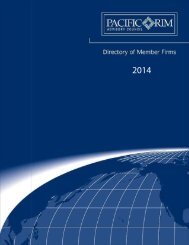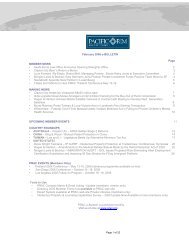A Guide to the Law of Securitisation in Australia - Clayton Utz
A Guide to the Law of Securitisation in Australia - Clayton Utz
A Guide to the Law of Securitisation in Australia - Clayton Utz
- No tags were found...
Create successful ePaper yourself
Turn your PDF publications into a flip-book with our unique Google optimized e-Paper software.
(FSR) represents <strong>the</strong> second stage <strong>of</strong> <strong>the</strong> implementation <strong>of</strong> <strong>the</strong>Wallis Inquiry and has two pr<strong>in</strong>cipal aspects:• <strong>the</strong> licens<strong>in</strong>g <strong>of</strong> participants <strong>in</strong> <strong>the</strong> f<strong>in</strong>ancial services <strong>in</strong>dustry;and• a disclosure regime <strong>in</strong> relation <strong>to</strong> f<strong>in</strong>ancial products.As a general rule, <strong>the</strong> product disclosure regime only applies <strong>to</strong>participants <strong>in</strong> <strong>the</strong> retail market. The dist<strong>in</strong>ction between “retail”and “wholesale” for FSR purposes is set out <strong>in</strong> section 761G <strong>of</strong><strong>the</strong> Corporations Act and is similar <strong>to</strong> <strong>the</strong> test <strong>in</strong> section 708(discussed <strong>in</strong> section 2.2.4) <strong>in</strong> relation <strong>to</strong> <strong>the</strong> requirement <strong>to</strong>lodge a prospectus for an issue <strong>of</strong> securities. It <strong>in</strong>cludes that <strong>the</strong>provision <strong>of</strong> a f<strong>in</strong>ancial product will not be “retail” if <strong>the</strong> price <strong>of</strong><strong>the</strong> f<strong>in</strong>ancial product equals or exceeds $500,000 (section761G(7)(a)).As almost all securitisations <strong>in</strong> <strong>Australia</strong> occur <strong>in</strong> <strong>the</strong> wholesalemarket (see section 2.2.4), participants <strong>in</strong> <strong>the</strong> securitisation<strong>in</strong>dustry will usually only need <strong>to</strong> consider <strong>the</strong> new licens<strong>in</strong>gregime.2.3.2 When is a licence required?Previously <strong>the</strong> Corporations Act only required licences <strong>to</strong> beobta<strong>in</strong>ed by persons who carried on a securities bus<strong>in</strong>ess (whowere required <strong>to</strong> have a dealer’s licence) or an <strong>in</strong>vestment advicebus<strong>in</strong>ess (who were required <strong>to</strong> have an <strong>in</strong>vestment adviser’slicence).The FSR amendments have significantly widened <strong>the</strong> class <strong>of</strong>persons <strong>in</strong> <strong>the</strong> f<strong>in</strong>ancial services <strong>in</strong>dustry required <strong>to</strong> obta<strong>in</strong> alicence <strong>to</strong> operate <strong>the</strong>ir bus<strong>in</strong>ess.Section 911A(1) <strong>of</strong> <strong>the</strong> Corporations Act requires that an<strong>Australia</strong>n F<strong>in</strong>ancial Services Licence (AFSL) be obta<strong>in</strong>ed by aperson who “carries on a f<strong>in</strong>ancial services bus<strong>in</strong>ess” <strong>in</strong><strong>Australia</strong>. Section 911D provides that a f<strong>in</strong>ancial servicesbus<strong>in</strong>ess is taken <strong>to</strong> be carried on <strong>in</strong> <strong>Australia</strong> if <strong>in</strong> <strong>the</strong> course <strong>of</strong><strong>the</strong> bus<strong>in</strong>ess “<strong>the</strong> person engages <strong>in</strong> conduct that is <strong>in</strong>tended <strong>to</strong><strong>in</strong>duce people <strong>in</strong> <strong>Australia</strong> <strong>to</strong> use <strong>the</strong> f<strong>in</strong>ancial services <strong>the</strong>person provides or is likely <strong>to</strong> have that effect”.The term “bus<strong>in</strong>ess” is not def<strong>in</strong>ed <strong>in</strong> <strong>the</strong> FSR provisions(although <strong>the</strong>re is some guidance <strong>to</strong> <strong>the</strong> mean<strong>in</strong>g <strong>of</strong> carry<strong>in</strong>g on abus<strong>in</strong>ess <strong>in</strong> Division 3 <strong>of</strong> Part 1.2 <strong>of</strong> <strong>the</strong> Corporations Act which isalso applicable <strong>to</strong> <strong>the</strong> question under FSR). In particular, it is notalways clear when a transaction or a series <strong>of</strong> transactions willconstitute a bus<strong>in</strong>ess – but <strong>the</strong>re is case law authority that, <strong>in</strong>some circumstances, even a s<strong>in</strong>gle transaction can constitute a“bus<strong>in</strong>ess”.A “f<strong>in</strong>ancial services bus<strong>in</strong>ess” is def<strong>in</strong>ed <strong>in</strong> section 761A <strong>of</strong> <strong>the</strong>Corporations Act, as “a bus<strong>in</strong>ess <strong>of</strong> provid<strong>in</strong>g f<strong>in</strong>ancial services.”Section 766A <strong>in</strong> turns sets out <strong>the</strong> circumstances <strong>in</strong> which aperson will “provide a f<strong>in</strong>ancial service”.In determ<strong>in</strong><strong>in</strong>g whe<strong>the</strong>r an AFSL is required for a participant <strong>in</strong><strong>the</strong> securitisation <strong>in</strong>dustry, <strong>the</strong>re are essentially four questions <strong>to</strong>be considered:• first, does <strong>the</strong> person do anyth<strong>in</strong>g <strong>in</strong> relation <strong>to</strong> a “f<strong>in</strong>ancialproduct”?• secondly, is what <strong>the</strong> person does <strong>the</strong> “provision <strong>of</strong> af<strong>in</strong>ancial service”?• thirdly, will <strong>the</strong> person have <strong>the</strong> benefit <strong>of</strong> a class orderissued by ASIC grant<strong>in</strong>g relief from <strong>the</strong> requirement <strong>to</strong> belicensed?• fourthly, will <strong>the</strong> person have <strong>the</strong> benefit <strong>of</strong> an exemptionfrom <strong>the</strong> requirement <strong>to</strong> be licensed?Each <strong>of</strong> <strong>the</strong>se issues is considered <strong>in</strong> turn <strong>in</strong> <strong>the</strong> follow<strong>in</strong>gsections.2.3.3 What is a f<strong>in</strong>ancial product?Section 763A <strong>of</strong> <strong>the</strong> Corporations Act provides that a f<strong>in</strong>ancialproduct is a facility through which, or through <strong>the</strong> acquisition <strong>of</strong>which, a person does one or more <strong>of</strong> <strong>the</strong> follow<strong>in</strong>g:• makes a f<strong>in</strong>ancial <strong>in</strong>vestment;• manages f<strong>in</strong>ancial risk; or• makes non-cash payments.Each <strong>of</strong> <strong>the</strong>se terms is fur<strong>the</strong>r def<strong>in</strong>ed. Section 764A conta<strong>in</strong>s alist <strong>of</strong> specific products which will be f<strong>in</strong>ancial products whe<strong>the</strong>ror not <strong>the</strong>y fit <strong>the</strong> general def<strong>in</strong>itions. Section 765A <strong>in</strong> turn listsspecific products that will not be f<strong>in</strong>ancial products and overridesboth sections 763A and 764A. The follow<strong>in</strong>g are examples <strong>of</strong>some products, relevant for securitisation, that will be f<strong>in</strong>ancialproducts:• shares;• debentures;• bank accounts;• derivatives;• <strong>in</strong>surance policies (with some exceptions);• <strong>in</strong> some limited cases, <strong>the</strong> underly<strong>in</strong>g receivables be<strong>in</strong>gsecuritised.13






